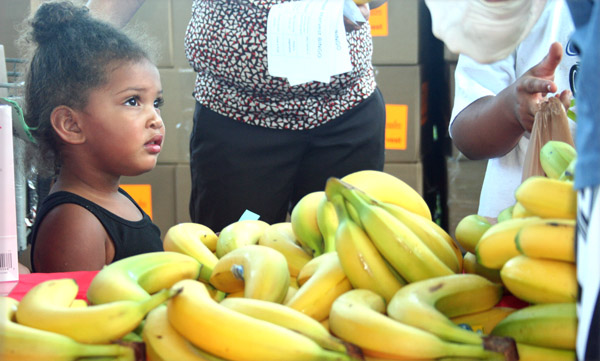Feeding the hungry involves more than filling bellies.
“We serve any nonprofit organization that is providing food to needy individuals at no charge,” says Estella Mayhue-Greer, president and CEO of Mid-South Food Bank.
“We want to be sure that we’re not just feeding people but helping them be healthier by providing nutritious products. We are able to get fresh produce and proteins, as well as bakery products through our retail donation program.”

Food banks have long relied on shelf-stable products for obvious reasons.
Canned and boxed goods can last for a long time, and staples like tuna, peanut butter, rice and more remain important ingredients in the Mid-South Food Bank pantry.
In order to get enough food, 76% of Mid-South Food Bank clients eat food past its expiration date, grow food at home, pawn or sell personal property or water down food or drinks.
But the connection between the quality of food and health has become clearer.
As the rates of diabetes and high blood pressure rise in the population, there’s an effort to lessen consumption of foods with high sodium or sugar content.
When relying on donations, that requires a dedicated plan.
So Mayhue-Greer and her team work with nutritionists and dietetic associations to keep a focus on healthy foods. Teaming with local food retailers allows the food bank to offer more fresh vegetables, fruits and proteins.
Each day, they go to partners such as the Whole Foods grocery to pick up donations. In addition to those retail donations, the Mid-South Food Bank uses donated funds to purchase nutrition-packed products for its pantry.
“Fresh products are more expensive, and often out of reach for the people we provide services to,” Mayhue-Greer says. “Whole Foods may not sell certain fruits or vegetables because they don’t look pretty, but the food is still usable.”


Reaching out to many groups
Mid-South is one of five food banks in Tennessee operating within the Feeding America national network of food banks.
It serves residents of Tennessee, Arkansas and Mississippi, teaming with more than 300 charitable organizations and faith-based programs to serve a food-insecure population.
For every $1 that Mid-South Food Bank raises, it can provide 3 meals.
For families, it keeps pantries stocked in the areas it serves and also delivers food to those who are struggling, usually supplementing their food stamp purchases for the month.
For children, it supplies in-school pantries, sets up Kids’ Cafés, which provide a safe place for children in need to get meals and runs a backpack program, which gives school kids a backpack filled with weekend meals.
For seniors, it provides food boxes with ready-to-eat or easy-to-prepare foods.


Mid-South Food Bank also helps onsite programs that prepare meals for residents.
In addition to providing pantry staples, the food bank offers a weekly shopping list of foods in stock. The organization can order what it needs to create a variety of meals suited to the people they serve.
“A lot of our clients have special dietary needs, whether due to health issues or religious beliefs or philosophical views,” says Cordell Walker, director of the Memphis-based Alpha Omega Veterans Services, which helps homeless veterans get back on track.
“The food bank affords us enough variety that we can give everyone a meal that is nutritious and appealing to them.”
No matter where or how food gets to a person in need, the food bank always emphasizes the importance of a good diet.
“We have become more intentional about providing nutritious food and educating the people we serve about healthy eating so that we don’t add to the health issues that many people have,” says Mayhue-Greer.


To learn how Alpha Omega puts their food bank donations to use, click here.
Photos from Mid-South Food Bank’s Facebook page.
The post Serve Them Right appeared first on Better Tennessee.

